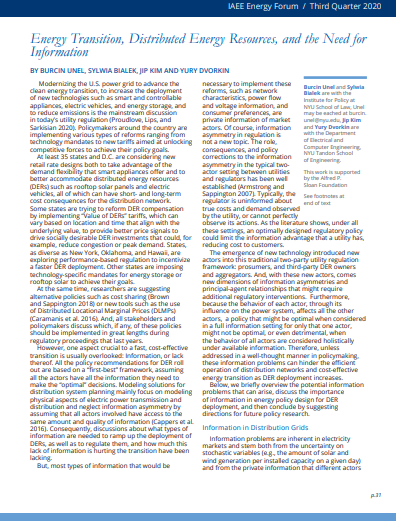-

Markets, Externalities, and the Federal Power Act: The Federal Energy Regulatory Commission’s Authority to Price Carbon Emissions
Article revised for the Environmental Law Reporter
This article, excerpted from Davis Noll and Unel’s article in the NYU Environmental Law Journal, provides a comprehensive economic framework to show that addressing the CO2 externality through a carbon price falls within FERC’s authority to ensure an efficient market.
-
Comments to New Jersey on Cost Test Straw Proposal
The New Jersey Board of Public Utilities (BPU) asked for comments on its straw proposal for the benefit-cost test that BPU would employ pursuant to the 2018 Clean Energy Act, which requires energy efficiency and peak demand reduction programs to satisfy a benefit-cost test. We submitted comments encouraging BPU to include avoided greenhouse gas emissions among the non-energy benefits it credits to energy efficiency and peak demand reduction projects. We also suggest that BPU adopt a tool and methodology for assessing the benefit of avoided local air pollutants that is more sensitive than those identified in the proposal.
-
New Mexico PRC Adopts Plan to Replace San Juan Coal Plant with Renewables Portfolio
In 2022, New Mexico’s largest utility company will retire the San Juan Generating Station, a coal-burning power plant that has operated since 1973. In light of the decision, the state’s Public Regulatory Commission (PRC) has adopted a plan to replace the plant’s power output with 100 percent renewable energy and battery storage. The plan is a significant victory for the community groups and environmental advocates that have pushed to expedite the clean energy transition, and our efforts helped pave the way for this decision.
-
Comments to Virginia on Developing an Energy Storage Rule
The Virginia State Corporation Commission asked for input in advance of developing a rule for energy storage deployment. Our comments note that energy storage deployment can increase emissions from the electricity sector, even if those deployments also facilitate the integration of variable renewable resources. We urge the Commission, under the Virginia Clean Economy Act, to adopt a rule ensuring that energy storage resources are deployed and operated in ways that reduce net emissions.
-
Comments to DOE on Energy Conservation Standards for Water Heaters
The Department of Energy (DOE) asked for input on conducting its national impact analysis, including on market failures, its emissions analysis, and monetization of benefits of emissions reductions. We submitted comments suggesting that DOE continue to monetize the full climate benefits of emissions reductions using the best available estimates of the social cost of greenhouse gases.
-
Comments to DOE on Energy Conservation Standards for External Power Supplies
The Department of Energy (DOE) asked for input on conducting its national impact analysis, including on market failures, its emissions analysis, and monetization of benefits of emissions reductions. We submitted comments suggesting that DOE continue to monetize the full climate benefits of emissions reductions using the best available estimates of the social cost of greenhouse gases.
-
Comments to FERC on Transmission Incentives
The Federal Energy Regulatory Commission proposed changes to its electric transmission incentives, which aim to spur the deployment of technologies that enhance reliability, efficiency, and capacity of transmission facilities. We submitted comments identifying significant problems with the proposal, including its reliance on a benefit-cost ratio for project selection.
-
Energy Transition, Distributed Energy Resources, and the Need for Information
Modernizing the U.S. power grid to advance the clean energy transition, to increase the deployment of new technologies such as smart and controllable appliances, electric vehicles, and energy storage, and to reduce emissions is the mainstream discussion in today’s utility regulation. Policymakers around the country are implementing various types of reforms ranging from technology mandates to new tariffs aimed at unlocking competitive forces to achieve their policy goals. We briefly overview the potential information problems that can arise, discuss the importance of information in energy policy design for DER deployment, and then conclude by suggesting directions for future policy research.
-
Comments to FERC on NERA Net Metering Petition
The New England Ratepayers Association (NERA) recently petitioned the Federal Energy Regulatory Commission (FERC) to effectively overturn net metering policies nationwide. While FERC has previously and definitively answered the jurisdictional question concerning net metering, NERA asserts without evidence that controversy persists. We submitted comments describing the flaws of NERA’s argument and urging FERC to reject the petition.
-
Comments to Colorado PUC on Valuing Distributed Energy Resources
The Colorado Public Utilities Commission (PUC) is exploring options for valuing distributed energy resources (DERs) in various contexts, including infrastructure planning, performance-based ratemaking, and others. We submitted comments identifying metrics that capture the value of DERs and suggesting how the PUC can employ those metrics to maximize benefits to the grid and society.
Viewing recent projects in Electricity



